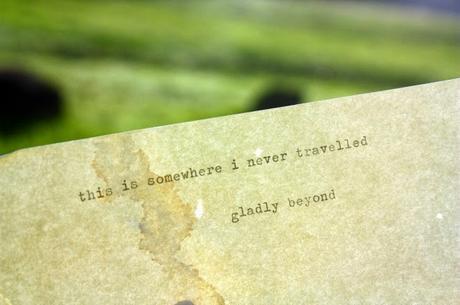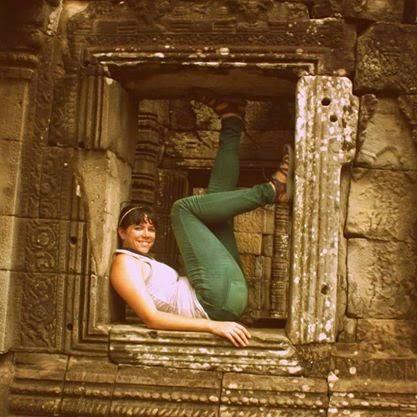I love when I get little treats in my inbox, and today's guest post was just such a lovely Monday morning surprise. The very talented Kayti Burt, who I met through the Go Girl Travel Network (really worth checking out if you happen to be a woman who loves travel), dropping this piece on personal space my way and I am thrilled to publish it.
I'd love to hear what you think about this idea, that personal space changes depending on where we are. It's certainly something I experience in London, where so many foreign cultures combine to make a funny little mixture of occasionally totally clashing norms and comfort zones, so I'm so happy Kayti tackled it in her usual respectful and thoughtful way.
_______________________________________________________________________________
I grew up in the middle of nowhere - at least by some definition of that phrase. In Coos County, the population density is 18 people per square mile, but there are large swaths of land with nothing but trees and moose and it takes a while to get "anywhere." My hometown is roughly three hours from both Boston and Montreal, the nearest shopping mall is at least an hour away, and the closest Starbucks is far enough away that I haven't bothered figuring out how long it would take to drive myself there.
The citizens of the North Country do have one resource in spades: space. I took this for granted growing up, as one does so many things. I took for granted that I didn't have to try to be the only person in a space for as far as my eye could see. I took for granted the room I had to breathe and be away from others. At times, this kind of space can turn almost claustrophobic. It can be beyond frustrating when all you want is a sizable, diverse sample of the world's population to examine and befriend and impress. But, most of the time, for me, it was normal.
false concept any traveler soon smashes to smithereens.)
My first real travel experience came when I was a junior in college. I spent the year studying abroad in Prague, the beautiful capital of the Czech Republic. In many ways, this was the perfect first city in which to spend a considerable amount of time. Prague is by no means crowded. It has a slowish pace of living, its trams slinking along on tracks and its cobblestone streets discouraging all but the most determined power-walkers. But it is decidedly more crowded than both my hometown and the small liberal arts college I attended. Because of this, it was the first time I started thinking about personal and public space in any real way. It was the first time I was forced to seek out spaces away from people.
Luckily, my apartment was only a block away from Prague's Petrin Park, a hilly green expanse that became my sanctuary. The rose garden and miniature Eiffel tower at the top garnered visitors, but there were always hideaways and paths in the middles of the park's labyrinth that remained gloriously deserted. When the leaves were still on its trees, it was easy to forget that there was a city just on the other side of the park's canopy. When the physical and mental crowdedness because too much, I would amble into Petrin and expand my personal space until it was as big as a hot air balloon.
My definition of a "personal bubble" was not truly tested until I visited Southeast Asia. Bangkok and Hanoi stand out in particular as cities where my personal space actually shrunk to a size smaller than my physical being. In many parts of those cities, it is unavoidable to brush up against strangers. In less crowded cities, bumping into someone might inspire an "excuse me." This did not seem to be as common in these cities; otherwise, you would spend your whole day doling out "pardon"s. Instead, it seems to be an accepted part of life. Bumping into someone is neither rude nor a reason to take offense. It is simply how personal and public space work when there is so little to go around.
A video I took of traffic in Hanoi, Vietnam
There seems to be an upside to this kind of living, too - at least, there was for me. There is something to be said to feel part of the world's population in this way. To have no choice but to crash into your fellow human beings, to recognize that you are one of many. To have that reality be unavoidable. To embrace it. For me, this is one of the singular joys of traveling. But, even as I write that, I wonder how I would feel if I didn't have the choice of leaving the crowded space and returning to my relative population desert. Or is that musing a presumptive one? Am I letting my own not-so-smashed-to-smithereens-as-I-would-like-to-believe idea of normalcy inform how I judge others?
The further I fall into this musing, the more I realize how the way I have framed this conversation reveals so much about my own personal relationship to space. Most presumptively, that space can be private. That it is something to be owned or controlled or co-opted for one's self. Yes, venturing out from the expanse of northern New Hampshire has changed how I see the world. Initially, in my dealings with wealthier, more populated regions of the United States, it has been further influenced by the Western capitalist insistence that space is something that can be owned, a commodity to be bought and sold. And, in my explorations of diverse places - both domestically and internationally - it has deepened my understanding that my understanding and relationship to space is informed by my own, narrow cultural upbringing.

_______________________________________________________________________________

Kayti is a television blogger, photographer, and chronic vagabond. Growing up in rural New Hampshire, she didn't have much opportunity to travel as a kid, but is making up for it as an adult. She had her first long-term experience abroad in Prague on a year-long study abroad program in college. More recently, she spent three months on the "Banana Pancake Trail" in Southeast Asia. As an introverted traveler, Kayti's favorite way to explore the world is in long, involved adventures featuring plenty of museums, plays, and ambling walks with her Canon Rebel in one hand and her journal in the other. You can follow Kayti on Twitter at @kaytiburt .
Got an article you'd like to share? I'd love to read it - but I get a lot of emails, so please be awesome like Kayti and check out the submission guidelines first!
